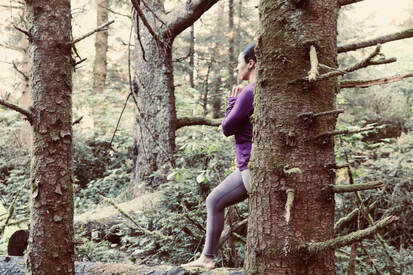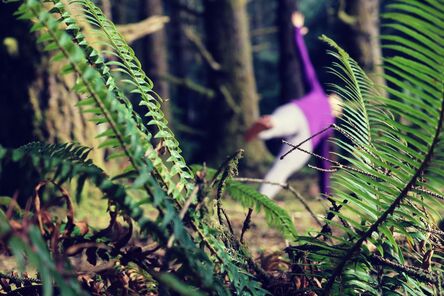Meditations with Tree
Take a couple minutes out of your day to meditate with Tree.
Each meditation is under 10 minutes and will be just what you need to recharge your battery.
Look for new videos and words of wisdom regularly.
Take a couple minutes out of your day to meditate with Tree.
Each meditation is under 10 minutes and will be just what you need to recharge your battery.
Look for new videos and words of wisdom regularly.

Stillness
Finding stillness is a skill, which takes practice and time to cultivate and master. When you practice yoga; you move, breathe and focus your mind on the pose at hand. You try to keep your breath, body and mind present for the entire hour or more, and that is a whole other set of skills that we work on during the yoga practice. But then for the last 5-10 minutes it's stillness, pretty much the complete opposite of what you were just doing. You are now told to let go of keeping your breathe any which way and let it be soft. You are told to not hold a pose, but to relax the body. And you are told not to focus, but to let go and watch the mind wander. This process of flexing and then releasing, focusing and then letting go, is a skillful way to relax and let go more deeply, it is a way to find stillness.
And what is stillness?
Stillness is the moment when you realize you are doing nothing and it feels good, relaxed but aware. Not wondering what’s next, not planning, and not remembering. You aren’t trying once you reach stillness, but you do have to stay persistent to find it. The mind will want to take you with it, the ego will start talking and you will start agreeing and before you know it, you are making judgments, plans and remembering again. So you flex and release. You focus on your breath, you become aware of all the sounds and characteristics of everything around you. You focus and flex the mind and then watch it relax and let go…to that moment of stillness.
It’s just a moment?
Stillness starts out as just a moment, those moments where you aren’t narrating your life in your head. You aren’t wanting, judging, liking or disliking. You are just being. Being where you are, immersed in the present sounds, flavors, and textures of what’s around you. Not thinking of how it could be better or what could be different. Not thinking, just being in the moment. And then over time, and with practice, those moments get strung together and you are, in a sense, being stillness. Life continues around you, the world continues to spin, but you, you are still within. The quietness inside becomes more enjoyable than listening to the constant inner-narrator. The mind and ego become a repetitive nuisance, always trying to pull you away from those glorious moments of bliss, of stillness.
Finding stillness is a skill, which takes practice and time to cultivate and master. When you practice yoga; you move, breathe and focus your mind on the pose at hand. You try to keep your breath, body and mind present for the entire hour or more, and that is a whole other set of skills that we work on during the yoga practice. But then for the last 5-10 minutes it's stillness, pretty much the complete opposite of what you were just doing. You are now told to let go of keeping your breathe any which way and let it be soft. You are told to not hold a pose, but to relax the body. And you are told not to focus, but to let go and watch the mind wander. This process of flexing and then releasing, focusing and then letting go, is a skillful way to relax and let go more deeply, it is a way to find stillness.
And what is stillness?
Stillness is the moment when you realize you are doing nothing and it feels good, relaxed but aware. Not wondering what’s next, not planning, and not remembering. You aren’t trying once you reach stillness, but you do have to stay persistent to find it. The mind will want to take you with it, the ego will start talking and you will start agreeing and before you know it, you are making judgments, plans and remembering again. So you flex and release. You focus on your breath, you become aware of all the sounds and characteristics of everything around you. You focus and flex the mind and then watch it relax and let go…to that moment of stillness.
It’s just a moment?
Stillness starts out as just a moment, those moments where you aren’t narrating your life in your head. You aren’t wanting, judging, liking or disliking. You are just being. Being where you are, immersed in the present sounds, flavors, and textures of what’s around you. Not thinking of how it could be better or what could be different. Not thinking, just being in the moment. And then over time, and with practice, those moments get strung together and you are, in a sense, being stillness. Life continues around you, the world continues to spin, but you, you are still within. The quietness inside becomes more enjoyable than listening to the constant inner-narrator. The mind and ego become a repetitive nuisance, always trying to pull you away from those glorious moments of bliss, of stillness.

Breathing
Breathing is such an automatic, everyday thing, and yet so fundamental to living. When we start to talk about breathing it’s nice to pause and take a deep breathe and notice, how are you breathing today?
Is it easy to take in a big inhale, or is there restriction, tightness?
Can you slow down the exhale, but still push out all the air?
Do you feel hurried to take the next inhale?
Notice how much patience it takes to watch your breath lengthen out?
Our breath is connected to our emotions. When we are mad, stressed, or anxious, our breath gets short and shallow. This limits the oxygen to our brain, inhibiting our ability to make rational decisions. When we are relaxing and letting go, we take longer exhales, sigh or even let out a yawn. This helps get rid of any stale air that we might have stored up during stressful times, while we were taking short, shallow breathes. These long exhales then allow us to take fuller inhales, which brings more oxygen to the brain, making problem solving easier, making life easier. So when we find ourselves getting frustrated or nervous, we try to take long, slow breathes, and when we find ourselves stressed or angry, we try to use the exhales to relax and let go. And this helps…to some degree.
The deeper connection between breath and emotions is consciousness. When our emotions get loud or crazy or when our breath gets short and shallow, they are both signs we are not being present. Our mind gets wrapped up in the past and the future, how we remember things, and how we think it will all turn out. The mind is so powerful that it triggers the body to respond, even if it’s all in our imagination and there is no physical stimulus in front of us, our breath changes. When we think about a stressful situation, we trigger our body as if we are actually in a stressful situation. By focusing on the breath we bring ourselves back to the present moment. You cannot breath in the past and you cannot breathe in the future, you can only breathe here and now. When we reconnect to the breath, we use it as a tool to consciously reconnect to the present moment. How are you right now? Are you safe right now? Can you breathe right now? The past is done, and how we remember it will change over time. The future has yet to be, and has infinite possibilities, which means our imagination cannot come up with all that could potentially happen. Ultimately, we are left with the present moment to act within, to be within. How can we be here right now, amongst the constant swirl of past thoughts and future worries? Can we breathe and consciously stay present, here in the ever-present now?
Breathing is such an automatic, everyday thing, and yet so fundamental to living. When we start to talk about breathing it’s nice to pause and take a deep breathe and notice, how are you breathing today?
Is it easy to take in a big inhale, or is there restriction, tightness?
Can you slow down the exhale, but still push out all the air?
Do you feel hurried to take the next inhale?
Notice how much patience it takes to watch your breath lengthen out?
Our breath is connected to our emotions. When we are mad, stressed, or anxious, our breath gets short and shallow. This limits the oxygen to our brain, inhibiting our ability to make rational decisions. When we are relaxing and letting go, we take longer exhales, sigh or even let out a yawn. This helps get rid of any stale air that we might have stored up during stressful times, while we were taking short, shallow breathes. These long exhales then allow us to take fuller inhales, which brings more oxygen to the brain, making problem solving easier, making life easier. So when we find ourselves getting frustrated or nervous, we try to take long, slow breathes, and when we find ourselves stressed or angry, we try to use the exhales to relax and let go. And this helps…to some degree.
The deeper connection between breath and emotions is consciousness. When our emotions get loud or crazy or when our breath gets short and shallow, they are both signs we are not being present. Our mind gets wrapped up in the past and the future, how we remember things, and how we think it will all turn out. The mind is so powerful that it triggers the body to respond, even if it’s all in our imagination and there is no physical stimulus in front of us, our breath changes. When we think about a stressful situation, we trigger our body as if we are actually in a stressful situation. By focusing on the breath we bring ourselves back to the present moment. You cannot breath in the past and you cannot breathe in the future, you can only breathe here and now. When we reconnect to the breath, we use it as a tool to consciously reconnect to the present moment. How are you right now? Are you safe right now? Can you breathe right now? The past is done, and how we remember it will change over time. The future has yet to be, and has infinite possibilities, which means our imagination cannot come up with all that could potentially happen. Ultimately, we are left with the present moment to act within, to be within. How can we be here right now, amongst the constant swirl of past thoughts and future worries? Can we breathe and consciously stay present, here in the ever-present now?

